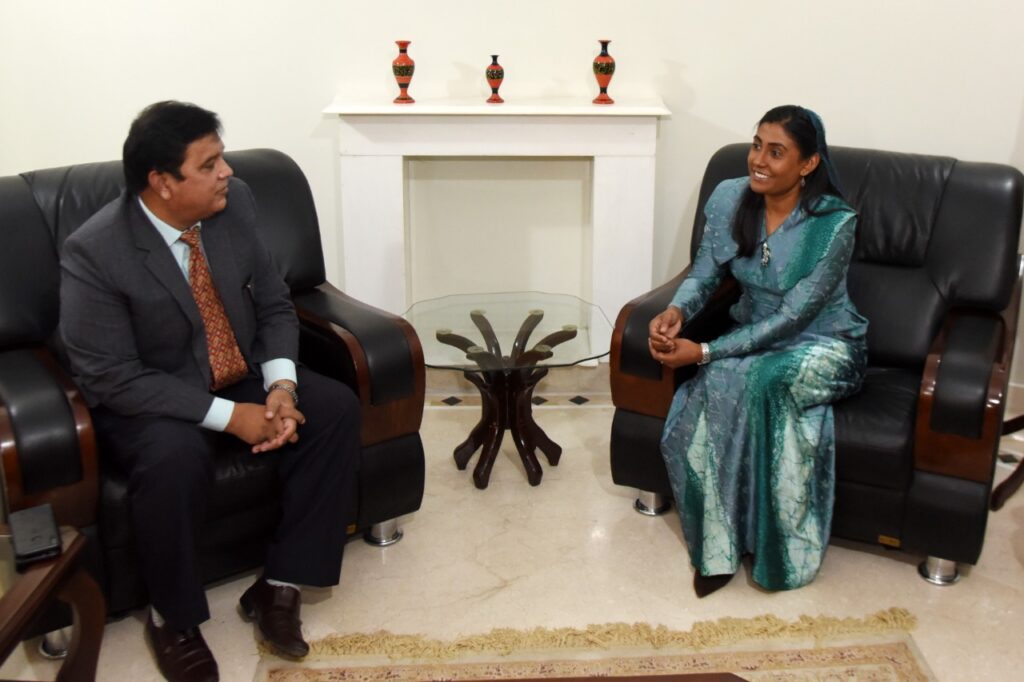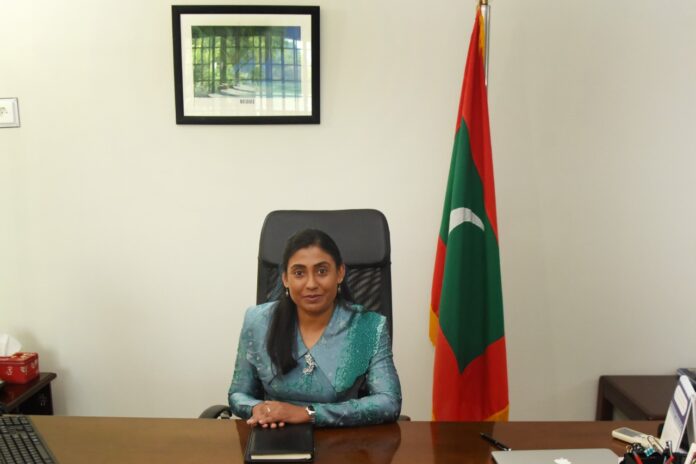An Exclusive Interview of H.E Farzana Zahir High Commissioner of Maldives to Pakistan
Exclusive Interview By Naveed Ahmad Khan Photos By Raja Ghulam Farid
Maldives and Pakistan are enjoying cordial and storing mutual relationship. To describe the friendly relationship from a diplomatic eye and to explore the further opportunities for enhancement of relationship, Daily The Spokesman has conducted the interview of H.E.Ms.Farzana Zahir, High Commissioner of Maldives to Pakistan
How would you like to describe diplomatic ties between Pakistan and Maldives?
Maldives and Pakistan have always shared close bonds of friendship that is based on shared interest and mutual respect. Our relations are cordial at all levels and maintaining that friendship is important for the Maldives and Pakistan. Foreign Minister Abdulla Shahid has met with Foreign Minister Bilawal Bhutto Zardari twice this year in New York. We also had high level representations from the Maldives in Pakistan to attend the 48th Council of Foreign Ministers meeting in Pakistan from 22-23 March this year and the 17thextraordinary session of the OIC Council of Foreign Ministers meeting in December 2021.
As neighbours, countries of the South Asia will remain as one of the key priorities for the Maldives. We also share many commonalities with the people of Pakistan that forms a special bond between our peoples.
What measures would you like to suggest for further enhancement of bilateral ties between both the countries?
Both countries cooperate on a wide range of areas, especially in the multilateral forums. We support each other on issues of mutual importance to developing countries such as promoting sustainable development, addressing climate change, advancing multilateralism and countering terrorism. Regular and focused dialogue is what is required to facilitate better cooperation.
 To foster closer engagement, I think we also need to work on enhancing trade and investment between Maldives and Pakistan. Currently the level of trade between us remains low. Maldives does not export to Pakistan. Imports to Maldives from Pakistan, while it has increased over the years, is around 9 million dollars. The potential is far greater.
To foster closer engagement, I think we also need to work on enhancing trade and investment between Maldives and Pakistan. Currently the level of trade between us remains low. Maldives does not export to Pakistan. Imports to Maldives from Pakistan, while it has increased over the years, is around 9 million dollars. The potential is far greater.
How can both the countries enhance existing trade and economic cooperation?
The biggest challenge for us remains the connectivity issue. However, that aside, there is a lot of potential to increase trade. We can focus on specific industries where Pakistan is doing well. For that we need exchange of trade delegations and have targeted talks between industries and Chambers of commerce. Although we are a small population, our vibrant tourism industry offers much room for export of food items, textiles and construction materials including steel from Pakistan to the Maldives. Additionally, there is also potential to export halal meat, pharmaceuticals, as well as sports goods and equipment from Pakistan to the Maldives.
How can Pakistan and Maldives play in important role on diplomatic fronts at the regional level?
Maldives and Pakistan are deeply affected by the current climate crisis. Both of us are developing countries and battling the impacts of thecrisis at the front line. In Maldives, our islands are on average about 1.5m above sea level and therefore the projected sea level rise will be disastrous for the Maldives. Monsoon rain and glacier melts in Pakistan this year alone have caused so much destruction to critical infrastructure and destroyed lives and livelihoods of millions of people forcing them out of their homes. This is unacceptable and a huge injustice for our people when global emissions are driven high by some industrialized countries.
 We are highly dependent on global carbon emissions being reduced enough to limit global temperature rise to 1.5degree (centigrade). We also need significant funds to pursue our adaptation goals. The climate adaptation needs of both our countries continues to force funding away from much needed finance for socio economic development of our people. These are areas where both our countries can work together at the international front.
We are highly dependent on global carbon emissions being reduced enough to limit global temperature rise to 1.5degree (centigrade). We also need significant funds to pursue our adaptation goals. The climate adaptation needs of both our countries continues to force funding away from much needed finance for socio economic development of our people. These are areas where both our countries can work together at the international front.
I welcome the efforts of Pakistan this year as the Chair of the Group of 77 and China to have led the efforts to establish a dedicated ‘Fund for Loss and Damage’ in COP27 in Sharm-el-Sheikh.
“Maldives & Pakistan are affected from climate crisis being low carbon emission countries”
What role can Pakistani experts play in uplifting industrial and manufacturing sectors in Maldives?
Maldives does not have a huge manufacturing sector. Our biggest industries are fisheries and tourism. However, Maldives offers attractive opportunities and incentives for foreign investors. We are trying to diversify our economy by facilitating investment in targeted sectors such as construction, agribusiness, transport, energy and the financial sectors.
We do welcome Pakistani investors to the Maldives. As we expand our tourism sector there are many opportunities there as well. This year, we held an online session for Pakistani investors to brief on the investment opportunities for development of Tourist Resorts in the Maldives. We hope to hold more of such sessions in the future.
How both nations can get further close ties through people to people exchanges or somewhat other measures?
People to people exchanges are important. It is the best way to foster closer ties between our peoples. Even now, Maldivians have a special bond with the people of Pakistan. This emerges from the historical bond and cultural similarities. More recently, this was evident from the sentiments of the Maldivian community towards the people affected by floods in Pakistan. It is the way in which the Maldivian community and civil society got together to raise much needed funds to help our brothers and sisters in Pakistan.
I am also happy to share that the number of tourists from Pakistan to Maldives has more than doubled in the past few years.
What measures would you like to suggest for Pakistan to enhance cooperation in educational sector with Maldives?
The best way is for institutions to form collaborative partnerships. Like Pakistan, Maldives also have a vibrant young population. Many seeking opportunities for good education. With collaborative partnerships, we can encourage more student and faculty exchanges. This way both countries can share their expertise. This is already happening. This year also we have seen some collaborations between the Maldives National University and well-respected institutions in Pakistan.
Likewise, sports in also another area where we can help our young people to train and facilitate exchange for development.
“Pakistani people can collaborate with Maldives in education, tourism & construction industry”
In what sectors can Maldivian experts assist Pakistan?
Maldives is very well known for our tourism sector. We have a lot of expertise in managing the tourism industry. We are very proud to have won World’s leading Destination Award again this year at the World Travel Awards. This is the third consecutive year that we got this title. This year we also won the World’s Leading Tourist Board award. When we began our tourism journey 50 years ago, it was very exclusive to highend tourism. The resorts in the Maldives are renowned for their luxury facilities and secluded surroundings. But now we have expanded our tourism into many other areas like guesthouses, hotels and liveaboards that offer equally memorable experiences at reasonable prices.
There is also a growing interest for adventure tourism worldwide. Maldives offers unique experiences such as underwater spas, restaurants, bubble tents on the beach. Adventures such as sea plane trips, sunset fishing and even snorkeling and diving experiences that can bring you closer to the underwater beauty and nature.
Maldives is also positioning itself as a leading destination for Meetings, Incentives, Conferences and Events (MICE). We are re-inventing this concept to merge business with leisure, and to conduct gatherings in a less traditional environment. There is a lot that we are experiencing in the tourism sector, from which Pakistan can also learn.
Profile of H.E Farzana Zahir High Commissioner of Maldives to Pakistan
High Commissioner Farzana joined the Department of External Resources of the Ministry of Foreign Affairs in 1996 as a Secretary. Since then she has served in different functions at the Ministry of Foreign Affairs.
She served as a Counsellor at the Maldives High Commission in Malaysia from 2009 to 2012. She was also a member of the Maldives delegation to the main sessions of the United Nations General Assembly from 2015 – 2019.
Before she was appointed as the High Commissioner, she served as the Deputy Permanent Representative at the Permanent Mission of the Maldives to the UN in New York from 2017 till 2020. During this time, Ms. Farzana led the work of the Maldives Chairmanship of the Alliance of Small Island States (AOSIS) in 2017 and 2018, advocating for the special circumstances of Small Island States at the UN. This included leading negotiation efforts on behalf of Small Island Developing States (SIDS), for the recognition of their specific challenges, more specifically in the areas of sustainable development, climate change and oceans issues. She also took special interest in the area of Disaster Risk Reduction, including coordinating the Disaster Risk Reduction Resolution for the Group of 77 and engaging closely in other efforts in this area.
High Commissioner Farzana graduated from Australian National University with a Bachelor of Arts (Development Studies) and with Master of Development Studies from Victoria University of Wellington, New Zealand. She is married with two children.







